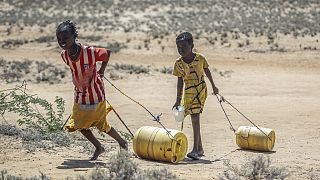Drought
Agricultural workers in Ethiopia, Kenya, and Somalia are preparing for their most severe drought in 40 years. This occurs as authorities warn that higher temperatures and less than normal rainfall were recorded by weather agencies in March and April this year.
The aggravating drought is threatening to throw the population, especially in arid and semi-arid areas, into starvation.
Like most of Africa, the east and the Horn's economic mainstay is agriculture, which is rain-fed, making it vulnerable to extreme weather events.
According to the Intergovernmental Authority on Development, rains will likely fail for a fourth consecutive year, triggering fears of increased cases of malnutrition, threats to livelihoods, and severe risks for 29 million people in the region. "Approximately we have 29 million people are facing high levels of food insecurity according to the latest experts' estimates. Already 15.5-16 million of our sisters and brothers are in need of immediate food assistance due to this drought," said IGAD Executive Secretary Workneh Gebeyehu.
Drought and famine issues have become synonymous in the region and approximately 1.4 million children under the age of five in the horn of Africa are vulnerable to acute malnutrition.
For Dr. Mahamed Shafi, Director at Gode Hospital in Ethiopia, this is the worst drought they have witnessed in 20 years. "This drought is the worst drought that we have seen for the last 20 years. It affected the whole community, especially children, especially the under-five children. So we are getting here a lot of malnourished children, more than the children that we have seen six months ago, you know the number of admissions has increased from five patients per day to 15 patients per day." he said**.**
Zero rainfall during the short rains season late last year and the ongoing drought during the current long rains season have already led to crop failures and livestock deaths, ballooning food prices, and intercommunal conflicts over scarce pasture and dwindling water resources. Below-average rainfall for 2022 is likely to prolong the already extremely dry conditions which have not been experienced to this degree since 1981 and failure to deal with the issue of food security now will lead to more loss of lives in the future because of the same reason; drought.











Go to video
ICC warns of a dire humanitarian crisis in Sudan as the war rages on
01:15
Morocco says 2024 was the hottest year with temperatures reaching 47.7 degrees
Go to video
South Sudan: UN warns of imminent famine
01:09
Wars displace over 122 million people as global aid dwindles – UNHCR
01:49
UN warns of impact Sudan's humanitarian crisis is having on Chad
01:32
Land convoy leaves Tunisia for Gaza, in an effort to break Israel's siege